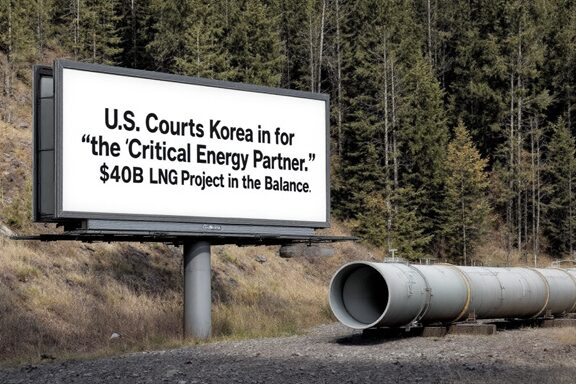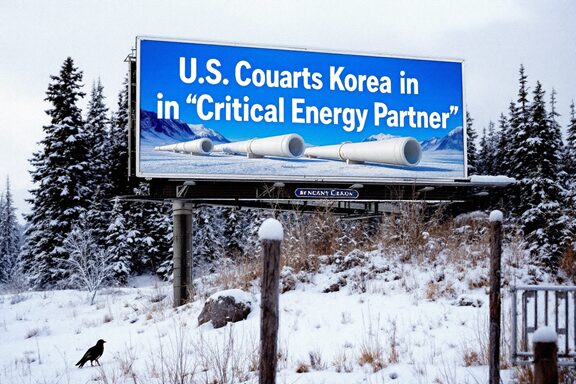U.S. Courts Korea as “Critical Energy Partner”: Alaska’s $40B LNG Project Hangs in the Balance
The geopolitical chess game for global energy dominance is heating up, with South Korea emerging as a pivotal player in America’s energy strategy. During yesterday’s “Energy Innovation Forum” in Seoul, Alaska Governor Mike Dunleavy and Acting Assistant Secretary of the U.S. Department of Energy Tommy Joyce delivered a clear message: South Korea is not just another energy partner—it’s one of America’s most critical allies in the energy landscape. What does this high-profile courting mean for both nations’ energy futures and economic relations?
America’s Energy Diplomacy Intensifies
The United States is deliberately positioning South Korea as a cornerstone of its global energy security strategy.
- Alaska Governor Dunleavy explicitly emphasized strengthening energy security and strategic partnerships with Korea, highlighting the importance of long-term cooperation between the two countries
- Acting Assistant Secretary Joyce referred to Korea as “one of America’s most important energy partners,” stating that U.S.-Korea cooperation is essential for enhancing global energy security
- This diplomatic push comes at a critical moment when global energy alliances are being realigned in response to various geopolitical tensions
Alaska’s LNG Megaproject Awaits Korean Commitment
The Trump administration continues to pressure Korea to participate in Alaska’s massive liquefied natural gas project as a key variable in bilateral trade negotiations.
- The U.S. is specifically seeking Korean investment in Alaska’s LNG project, which represents one of America’s largest potential energy infrastructure developments
- This project has become a significant bargaining chip in U.S.-Korea mutual tariff negotiations under the second Trump administration
- Korean participation would not only secure a major funding source but also guarantee a stable, long-term buyer for the project’s output
Risk-Reward Calculation for Korea
Korean officials and energy experts express caution about the substantial financial commitment and uncertain timeline.
- Korean stakeholders have voiced concerns about the tens of trillions of won investment required for the Alaska project
- The uncertain construction schedule presents significant risks for Korean investors and energy companies
- Korea must balance these financial considerations against the strategic benefits of strengthening its energy alliance with the United States
Global Energy Demand Drives Cooperation
Minister An Duk-geun of Korea’s Ministry of Trade, Industry and Energy acknowledged the growing global energy demands and emphasized the need for stronger cooperation frameworks.
- Minister An projected increasing worldwide energy demand in the coming decades, necessitating robust international partnerships
- He stressed the importance of strengthening cooperation systems with the United States and other major countries to ensure energy security
- This acknowledgment signals Korea’s recognition of the strategic importance of diversified energy partnerships, despite financial concerns

This high-level energy forum has once again confirmed the critical nature of the Korea-U.S. energy relationship. As the Alaska LNG project hangs in the balance, both nations are carefully calculating the economic and strategic implications of their energy partnership. For Korea, a nation highly dependent on energy imports, establishing stable supply chains through such cooperation frameworks remains essential—but at what cost?
Keywords
U.S.-Korea energy partnership, Alaska LNG project, energy security, Trump administration
Hashtags
#EnergyDiplomacy #KoreaUSRelations #LNGInvestment
한국어 요약
- 알래스카 주지사와 미국 에너지부 차관보 대행은 서울 ‘에너지 혁신 포럼’에서 한국을 미국의 가장 중요한 에너지 파트너로 강조
- 트럼프 행정부는 한미 상호관세 협상의 주요 변수로 한국의 알래스카 LNG 프로젝트 참여를 지속적으로 요청 중
- 한국 측은 수십조 원의 투자 필요성과 불확실한 건설 일정으로 인한 리스크를 우려
- 안덕근 산업통상자원부 장관은 증가하는 글로벌 에너지 수요에 대응하기 위해 미국과의 협력 체계 강화를 강조






